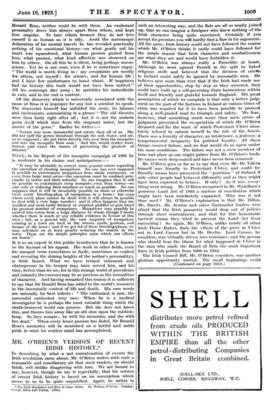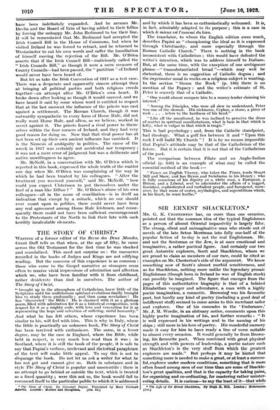MR. O'BRIEN'S VERSION OF RECENT IRISH HISTORY.*
IN describing by what a sad concatenation of events the Irish revolution came about, Mr. O'Brien writes with such a reasonable and conciliatory air that most readers, we should think, will dislike disagreeing with him. We are bound to say, however, though we say it regretfully, that his version of recent Irish history is based on an assumption which seems to us to be quite unjustified. Again, he writes in
• The Irish Revolution and How li Carac About. By William O'Brien. London: G6orge Allen and Uuwln. L165.1
such an interesting way, and the flats are all so neatly joined up, that we can imagine a foreigner who knew nothing of the Irish character being quite convinced. Certainly if you accept his premises you will hardly find a flaw in his argument. All the same, Irish history could not have followed the course which Mr. O'Brien thinks it easily could have followed for the simple reason that Irish character and combativimess are what they are and would have forbidden it.
Mr. O'Brien was always really a Parnellite at heart.
Although he went against Parnell in the split he hated religious strife and believed that the division of creeAr in Ireland could safely be ignored by reasonable men. He believes now more than ever that if the Irish had made use of their opportunities, step by step as they occurred, they could have built up a self-governing State harmonious within itself and friendly and grateful towards England. His great assumption of which we complain is that only a better judg- ment on the part of the factions in Ireland at various times of crisis was required for it to have been possible to proceed along a well-graded road to triumph and safety. We fear, however, that something much worse than mere errors of judgment prevented the co-operation of which Mr. O'Brien dreamed and for the want of which Protestant Ulster abso- lutely refused to submit herself to the rule of the Sou'..h. There was a ferocity of character, an intolerance, a jealousy, a temperamental incapacity for political loyalty. All these things ensured failure, and we fear would do so again under the same conditions. The failure was not a mere accident of time and place as one might gather from Mr. O'Brien's book. Its causes were deep-seated and have never been removed. Mr. O'Brien goes so far as to say that even Mr. De Valera
himself was friendly to Protestant Ulster, and could by friendly means have prevented the " partition " of Ireland if only other people had behaved differently and as they might have been expected to behave. If only 1 As it was, every- thing went wrong. Mr. O'Brien recognized in Mr. Wyndham's generous Land Act of 1903 a nucleus of conciliation which might have been indefinitely expanded. Why was it not thus used ? Mr. O'Brien's explanation is that Mr. Dillon, Mr. Devitt, Mr. Sexton and other Nationalist leaders were afraid that the Irish peasantry would drop out of politics through sheer contentment, and that for this lamentable tactical reason they tried to prevent the Land Act from succeeding I So, again, Mr. O'Brien, unlike nearly all other Irish Home Rulers, finds the villain of the piece in Ulster not in Lord Carson but in Mr. Devlin. Lord Carson, he considers, was virtually driven into resistance, and the person who should bear the blame for what happened in Ulster is • the man who made the Board of Erin the most important force in Irish politics from 1906 to 1916.
The Irish Council Bill, Mr. O'Brien considers, was another glorious opportunity wasted. The small beginnings could (Continued on page 1010.)
have been indefinitely expanded. And he accuses Mr. Devlin and the Board of Erin of having added to their follies by forcing the unhappy Mr. John Redmond to toe their line. It will be remembered that Mr. Redmond had accepted the Irish Council Bill in the House of Commons, but when he visited Ireland he was forced to retract, and he returned to Westminster to eat his own words and suffer the humiliation of himself moving the rejection of the Bill. Mr. O'Brien asserts that if the Irish Council Bill—maliciously called the " Irish Councils Bill," as though it were a mere measure of County Councils—had been passed, the " partition " of Ireland would never have been heard of.
But let us take the Irish Convention of 1917 as a test case. There was a desperate and apparently sincere attempt then at bringing all political parties and both religious creeds together—an attempt after Mr. O'Brien's own heart. It broke down after looking as though it would succeed, and we have heard it said by some whose word is entitled to respect that at the last moment the influence of the priests was cast against a settlement. The Roman Church, though it was outwardly sympathetic to every form of Home Rule, did not really want Home Rule, and often, as we believe, worked in secret against it. The priests feared a rival power to them- selves within the four corners of Ireland, and they had very good reason for doing so. Now that that rival power has at last been set up their own ancient influence has vanished. It is the Nemesis of ambiguity in politics. The cause of the wreck in 1917 was certainly not accidental nor temporary ; it was not a mere error of judgment but was a deliberate and native unwillingness to agree.
Mr. McNeill, in a conversation with Mr. O'Brien which is reported in this book, expressed the whole truth of the matter one day when Mr. O'Brien was complaining of the way in which he had been treated by his colleagues. " After the treatment you received yourself," said Mr. McNeil, " how could you expect Ulstermen to put themselves under the heel of a man like Dillon ? " Mr. O'Brien's abuse of his own colleagues—all in the name of conciliation—is in itself an indication that except by a miracle, which no one should ever count upon in politics, there could never have been any real agreement among Home Rule Irishmen, and conse- quently there could not have been sufficient encouragement to the Protestants of the North to link their fate with such terribly incalculable elements.







































 Previous page
Previous page